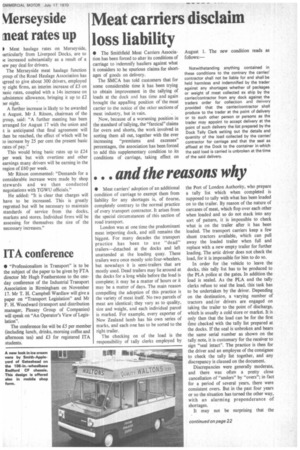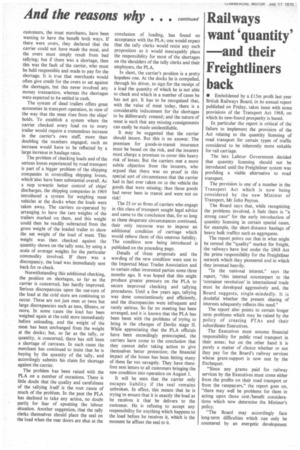. . . and the reasons why
Page 23

Page 24

If you've noticed an error in this article please click here to report it so we can fix it.
• Meat carriers' adoption of an additional condition of carriage to exempt them from liability for any shortages is, of course, completely contrary to the normal practice of every transport contractor. It arises from the special circumstances of this section of road transport.
London was at one time the predominant meat im-porting dock, and still remains the biggest. For many decades the transport practice has been to use "dead" trailers—detached at the docks and left unattended at the loading quay. These trailers were once mostly solo four-wheelers, but nowadays it is semi-trailers that are mostly used. Dead trailers may lie around at the docks for a long while before the load is complete; it may be a matter of hours or it may be a matter of days. The main reason compelling the adoption of this practice is the variety of meat itself. No two parcels of meat are identical; they vary as to quality, size and weight, and each individual parcel is marked. For example, every exporter of New Zealand lamb has his own series of marks, and each one has to be sorted to the right trailer.
The checking on of the load is the responsibility of tally clerks employed by the Port of London Authority, who prepare a tally list which when completed is supposed to tally with what has been loaded on to the trailer. By reason of the nature of carcases of meat, which flop over each other when loaded and so do not stack into any sort of pattern, it is impossible to check what is on the trailer after it has been loaded. The transport carriers keep a few shunt tractors available, which can pull away the loaded trailer when full and replace with a new empty trailer for further loading. The attic driver does not check the load, for it is impossible for him to do so.
In order for the vehicle to leave the docks, this tally list has to be produced to the PLA police at the gates. In addition the load is sealed. As the PLA and the tally clerks refuse to seal the load, this task has to be undertaken by the driver. Depending on the destination, a varying number of tractors and/or drivers are engaged on taking the trailer to the point of discharge, which is usually a cold store or market. It is only then that the load can be for the first Arne checked with the tally list prepared at the docks. If the seal is unbroken and bears the same serial number as shown on the tally note, it is customary for the receiver to sign "seal intact". The practice is then for the driver and an employee of the consignee to check the tally list together, and any discrepancy is claused on the document.
Discrepancies were generally moderate, and there was often a pretty close cancellation of "unders" by "overs"; in fact for a period of several years, there were consistent overs. But in the past four years or so the situation has turned the other way, with an alarming preponderance of shortages.
It may not be surprising that the
customers, the meat merchants, have been wanting to have the benefit both ways. If there were overs, they declared that the carrier could not have made the meat, and the overs must simply result from bad tallying; but if there was a shortage, then this was the fault of the carrier, who must be held responsible and made to pay for the shortage. It is true that merchants would often give credit for the overs to set against the shortages, but this never involved any money transaction, whereas the shortages were expected to be settled in cash.
The system of dead trailers offers great economies in transport operation, in view of the way that the meat rises from the ships' holds. To establish a system where the carrier checked every load on to every trailer would require a tremendous increase in the carrier's own staff, more than doubling the numbers engaged; such an increase would have to be reflected by a large increase in haulage rates.
The problem of checking loads and of the serious losses experienced by road transport is part of a bigger problem of the shipping companies in controlling shipping losses, which-also have been substantial overall. As a step towards better control of ships' discharges, the shipping companies in 1969 introduced a system for weighing meat vehicles at the docks when the loads were taken away. The carriers co-operated by arranging to have the tare weights of the trailers marked on them, and this weight could then be readily subtracted from the gross weight of the loaded trailer to show the net weight of the load of meat. This weight was then checked against the quantity shown on the tally note, by using a scale of average weights for the particular commodity involved. If there was a discrepancy, the load was immediately sent back for re-check.
Notwithstanding this additional checking, the position on shortages, so far as the carrier is concerned, has hardly improved. Serious discrepancies upon the out-turn of the load at the cold store are continuing to occur. These are not just ones or twos but large discrepancies such as tens, fifteens, or more. In some cases the load has been weighed again at the cold store immediately before unloading, and the weight of the meat has been unchanged from the weight at the docks; but, so far as the tally, or quantity, is concerned, there has still been a shortage of carcases. In such cases the merchant has continued to insist that he is buying by the quantity of the tally, and accordingly submits his claim for shortage against the carrier.
The problem has been raised with the PLA on a number of occasions. There is little doubt that the quality and carefulness of the tallying itself is the root cause of much of the problem. In the past the PLA has declined to take any action, no doubt partly for fear of upsetting the labour situation. Another suggestion, that the tally clerks themselves should place the seal on the load when the rear doors are shut at the conclusion of loading, has found no acceptance with the PLA; one would expect that the tally clerks would resist any such proposition as it would inescapably place the responsibility for most of the shortages on the shoulders of the tally clerks and their employers, the PLA.
In short, the carrier's position is a pretty hopeless one. At the docks he is compelled, through his driver, to sign for the receipt of a load the quantity of which he is not able to check and which in a number of cases he has not got. It has to be recognized that, with the value of meat today, there is a considerable inducement for the shortages to be deliberately created; and the nature of meat is such that any missing consignments can easily be made unidentifiable.
It may be suggested that the carrier should insure. But this is no answer. The premium for goods-in-transit insurance must be based on the risk, and the insurers must charge a premium to cover this heavy risk of losses. But the carriers met a more subtle objection from the insurers, who argued that there was no proof in this special sort of circumstance that the carrier had in fact ever taken on to the vehicle the goods that were missing; thus those goods had never been in transit and were not on risk!
The 25 or so firms of carriers who engage in this class of transport sought legal advice and came to the conclusion that, for so long as these desperate circumstances continued, their only recourse was to impose an additional condition of carriage which would relieve them of this onerous liability. The condition now being introduced is published on the preceding page.
Details of these proposals and the wording of the new condition were sent to the Imported Meat Trades Association and to certain other interested parties some three months ago. It was hoped that this might produce greater pressure on the PLA to secure improved checking and tallying procedures. Until a few years ago, tallying was done conscientiously and efficiently, and the discrepancies were infrequent and rarely serious. So far no meeting has been arranged, and it is known that the PLA has been beset with the problems of trying to bring in the changes of Devlin stage II. While appreciating that the PLA officials have been exceedingly preoccupied, the carriers have come to the conclusion that they cannot defer taking action to give themselves better protection; the financial impact of the losses has been hitting many of them far too savagely. They have therefore sent letters to all customers bringing the new condition into operation on August 1.
It will be seen that the carrier only escapes liability if the seal remains unbroken. In effect, this means that he is trying to ensure that it is exactly the load as he receives it that he delivers to the customer. He is refusing to accept any responsibility for anything which happens to the load before he receives it, which is the moment he affixes the seal to it.








































































































